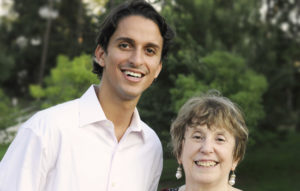“For people to trust each other and be able to hear each other won’t happen after just one meeting. This is about relationship-building.” – Jessica Wilson, MSW
Jessica Wilson, MSW encourages Emory’s medical students to talk to strangers. She gives the same advice to advanced nursing, physical therapy, and physician assistant students – all of whom take part in the Emory Center for Health in Aging Senior Mentor Program during their first year of study. This year, more than 300 students were paired with older adult mentors for this inter-disciplinary, service-learning opportunity that stretches across generations. Wilson, the program coordinator, recruits a diverse group of seniors ranging in age from 65-95, some of whom volunteer every year. Each mentor is paired with two students. The students have a set of required readings and assignments, but most of the learning takes place informally, as the students and mentors get to know one other.
As they build relationships, the students learn how to engage with older people and how to listen. Students who may have had little interaction with older adults other than their own grandparents must move beyond preconceived ideas of the elderly. “This is the only program that allows our health care students to interact with healthy aging adults,” says Wilson. “They rotate through hospitals and nursing homes and see sick and frail patients there, but the majority of their older patients in the real world will be vibrant, healthy seniors who are living independently and enjoying their later years. It’s crucial that they have exposure to this patient population early. Some of the students say, ‘Can’t I just call my grandmother?’ but it’s very different to talk to a stranger about personal–and perhaps uncomfortable–subjects the way that a health care provider has to talk to a patient.”
During its five-year history, the Senior Mentor Program has been tweaked, but its inclusion of students from four different programs is unique and gives the students an early opportunity for inter-professional learning. When students start trying to coordinate their schedules, they get a feel for the rigorous training that goes on in all the programs and gain mutual respect for their colleagues in other programs. The mentors benefit, as well. They enjoy the opportunity to share some of their wisdom with the students and, perhaps, to help the next generation of health care providers learn to connect more easily with the strangers who will become their patients. Some students and mentors have gotten really attached, and they go above and beyond – they have dinner together, attend family events, etc. It becomes a real friendship.
“We aren’t trying to lure every student into geriatrics,” says Wilson, “although we love it when they discover a new interest in geriatric medicine. Our real goal is to expose them to a population that they may not have much experience with and give them the opportunity to develop skills that they can take with them into their professional lives. They will understand some of the challenges of being a senior citizen and the rewards of working with this growing part of our patient population.”
Related Links
- Age (not-old) Advice – A mentoring program at Emory pairs seniors in the community with medical and nursing students to share lessons in aging
- VIDEO: Center for Health in Aging
- Emory Division of General Medicine and Geriatrics
- Emory University Department of Medicine
If you are interested in investing in research, clinical care, and/or education within the Emory University School of Medicine’s Division of General Medicine and Geriatrics, learn how you can help.


